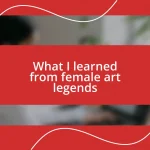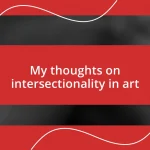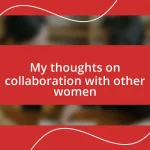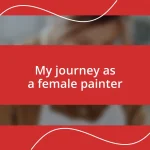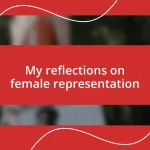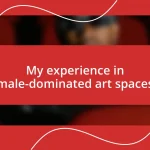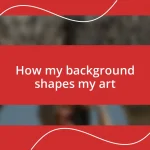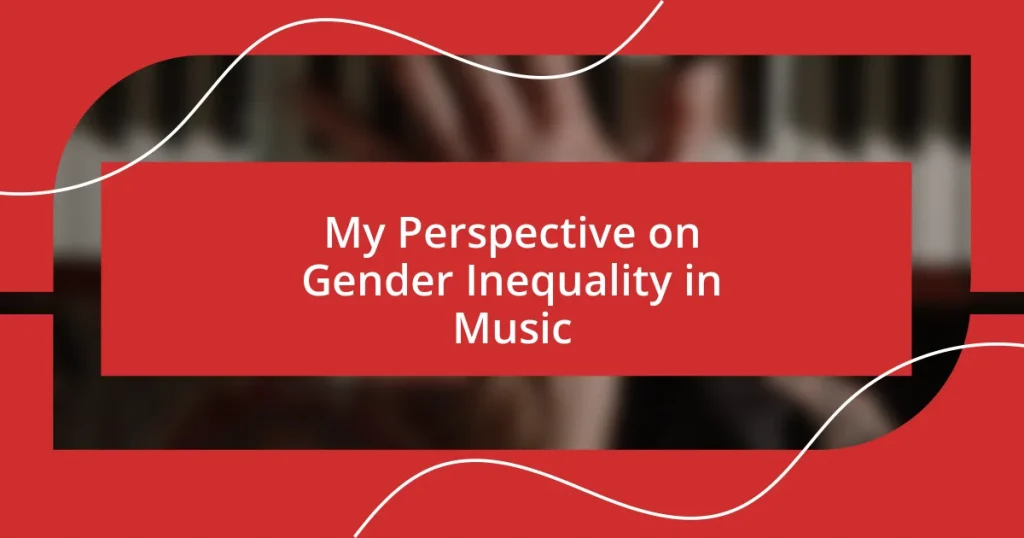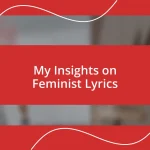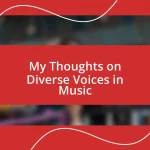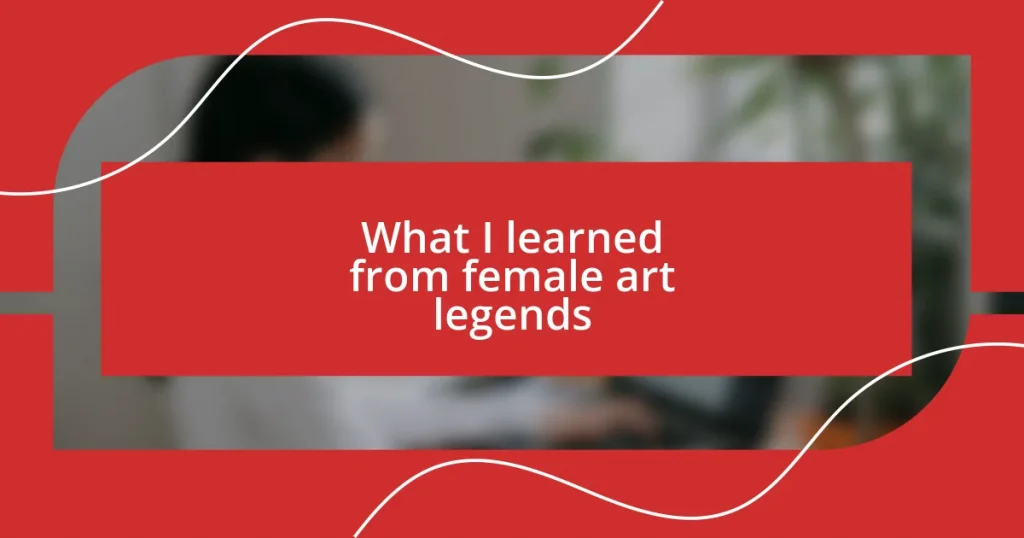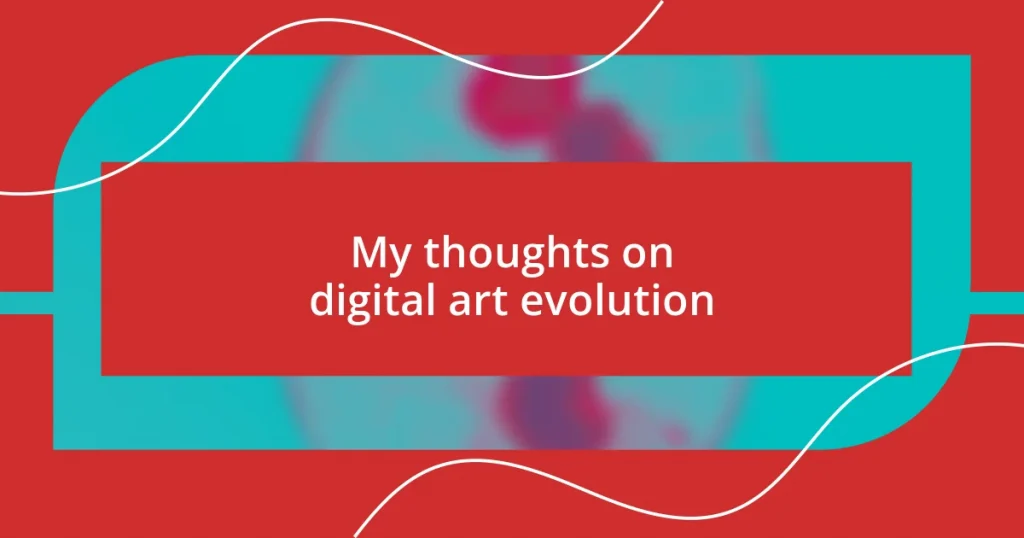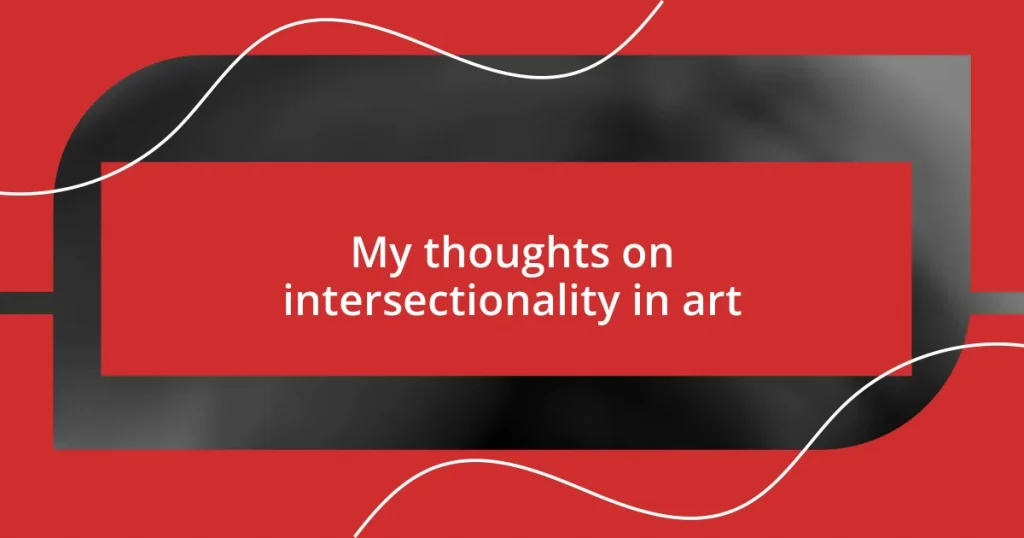Key takeaways:
- Gender inequality in the music industry is evident through significant disparities in representation, with only 22% of musicians on Spotify playlists being women and women winning only 10% of top Grammy awards in the last decade.
- Barriers such as limited access to industry networks, stereotype-driven marketing, work-life balance pressures, lack of financial opportunities, and underrepresentation in media hinder female artists’ success and visibility.
- Promoting equality requires amplifying female voices, establishing mentorship programs, and advocating for policy changes to ensure fair representation and equitable funding for female musicians.
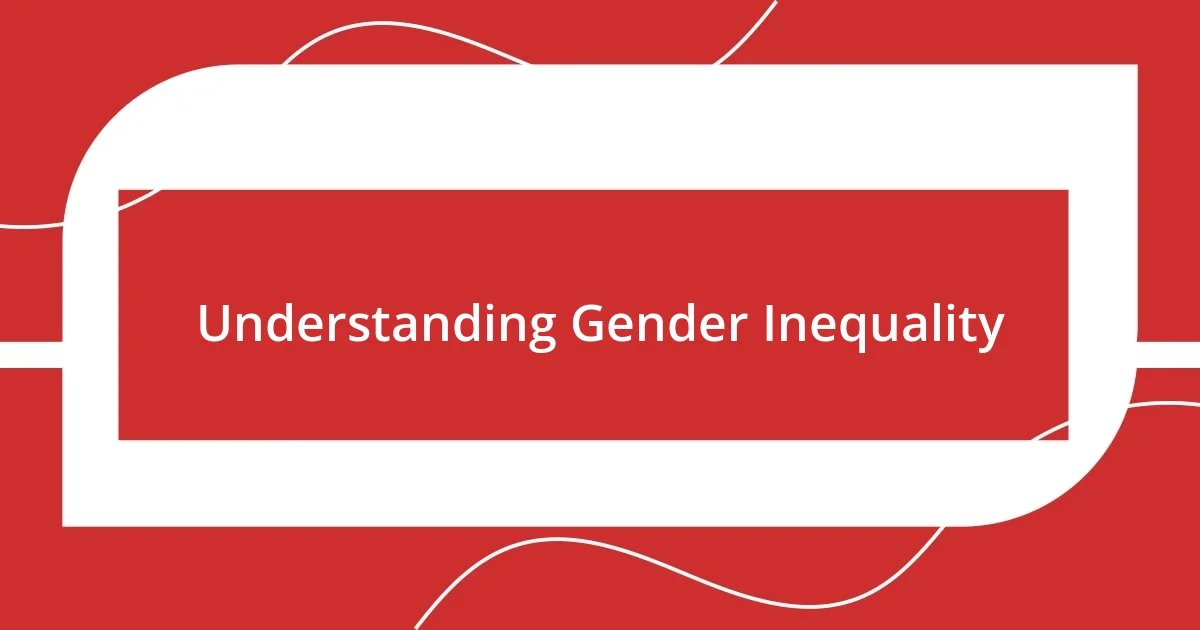
Understanding Gender Inequality
When I think about gender inequality, it often hits me on a deeply personal level. For instance, I recall attending a music festival where the lineup was overwhelmingly male. It struck me—why are women musicians so often sidelined? This isn’t just a statistical anomaly; it’s a reflection of systemic biases that permeate our industry.
Many people might wonder if this pattern is merely a coincidence. But through my experience, I’ve seen countless talented women struggle to get the recognition they deserve. It’s heartbreaking to witness incredible artists performing at smaller venues while their male counterparts dominate the main stages. This disparity isn’t just about numbers — it’s about the messages we send to both artists and audiences about whose music is valued.
In discussing gender inequality, we must recognize its multifaceted nature. It involves cultural stereotypes, access to opportunities, and the biases that can unconsciously inform how we view talent. I remember talking to a friend who aspired to be a sound engineer. Despite her passion and skill, she felt discouraged by a male-dominated environment that seemed indifferent to her presence. How many brilliant voices and innovative sounds are we missing because of an imbalanced playing field?
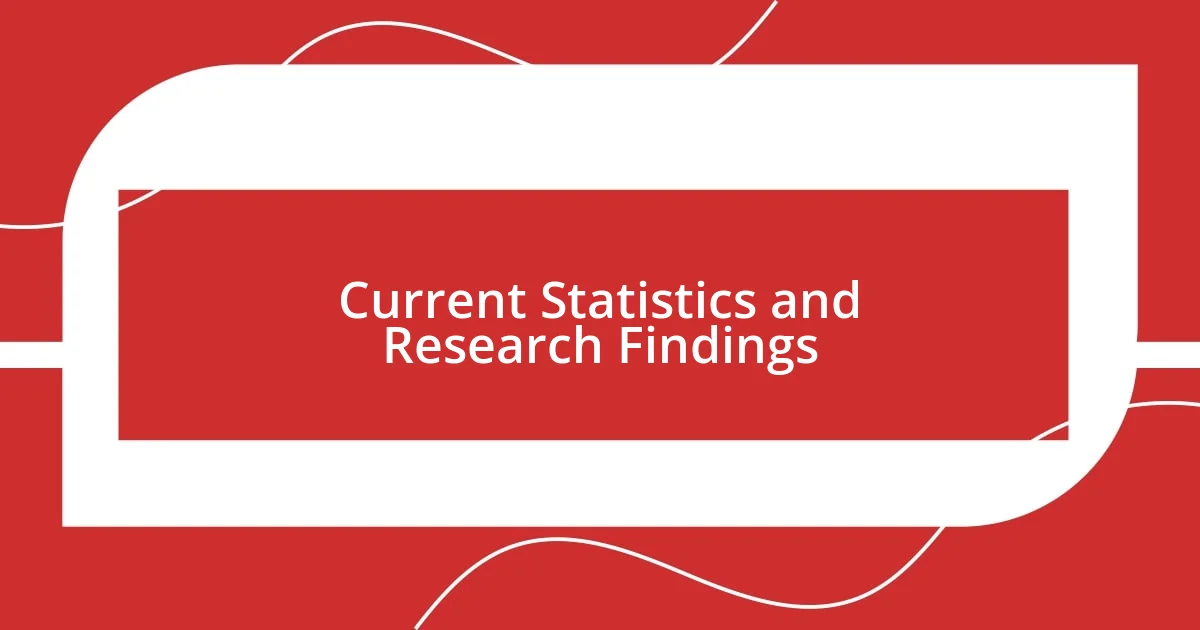
Current Statistics and Research Findings
While researching gender inequality in music, the statistics reveal alarming trends. A recent study found that only 22% of musicians featured on popular Spotify playlists are women. This stark difference is discouraging to up-and-coming female artists. Imagine investing all your energy into creating music, only to find minimal representation in platforms that could launch your career.
Furthermore, when examining award shows, the disparity becomes even more pronounced. For instance, the Grammy Awards have historically favored male nominees, with women winning only 10% of the top awards in the last decade. It makes me ponder: what does it say about our industry when so many distinct voices go unheard? It feels personally disappointing, as I’ve often found myself championing female musicians whose talent deserves massive recognition.
Research also indicates that women are less likely to be signed by record labels, with only 12% of signed artists being female. I recall a local talent showcase where the female performers, who had incredible potential, faced constant scrutiny. Seeing them struggle for validation made me realize how critical it is to have structures that support and uplift women’s contributions. The statistics aren’t just figures; they represent real people whose dreams and ambitions are being stifled.
| Statistic | Finding |
|---|---|
| Women on Spotify Playlists | 22% |
| Top Grammy Awards for Women | 10% |
| Signed Female Artists | 12% |
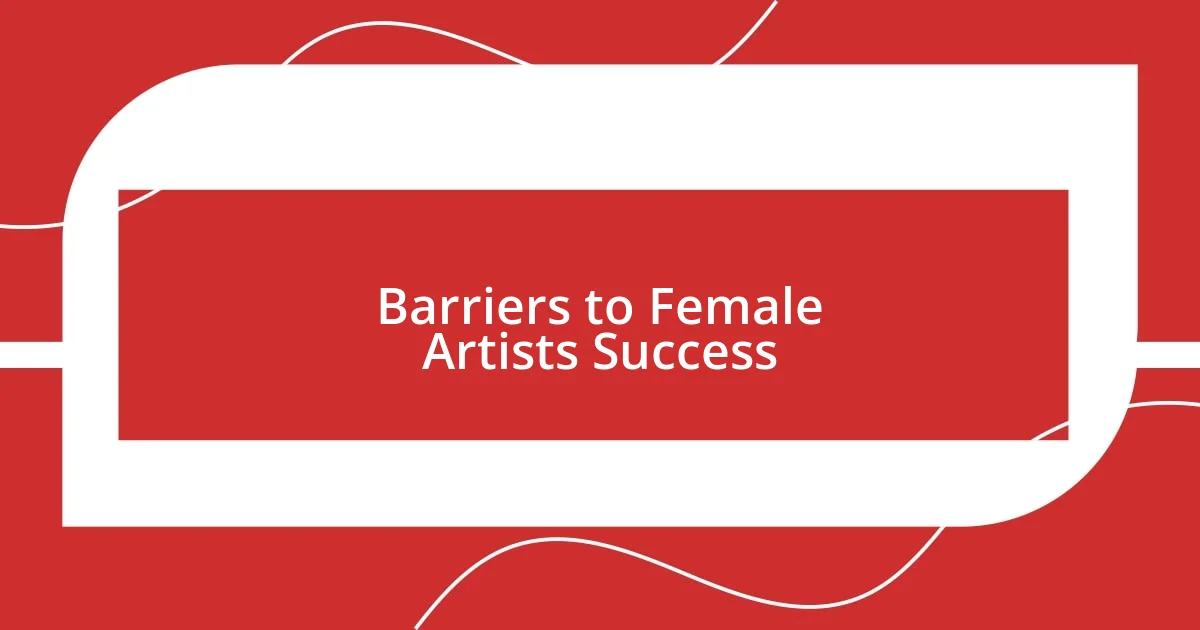
Barriers to Female Artists Success
Barriers to success for female artists often stem from deeply rooted societal attitudes and industry practices. I recall a conversation with a talented singer-songwriter who shared her frustration over being pigeonholed into specific genres simply because she is a woman. The expectation for female artists to fit neatly into conventional boxes can stifle creativity and deter them from pursuing their own unique sound. This limitation is both an emotional burden and a professional setback.
Several critical barriers contribute to the challenges female musicians face:
- Limited Access to Industry Networks: Most decision-makers in the music industry are still male, which can create an unwelcoming environment for women seeking mentorship or support.
- Stereotype-Driven Marketing: Women are often marketed based on appearance rather than talent, leading to a superficial understanding of their artistry.
- Work-Life Balance Pressures: Many female artists face societal pressures regarding family responsibilities, which can impede their career development.
- Lack of Financial Opportunities: Female artists often receive less funding for tours and projects, creating a significant financial hurdle.
- Underrepresentation in Media: A lack of visibility in music videos and publications means fewer role models for aspiring female artists, impacting their confidence and ambitions.
It’s frustrating to witness these barriers in action, knowing the immense talent women bring to the table. I remember watching a local female artist perform at an open mic night; her voice was hauntingly beautiful, yet she expressed doubt about her ability to pursue music full-time. Seeing her passionate yet visibly disheartened reinforced my belief that we need to dismantle these barriers and create a more equitable playing field.
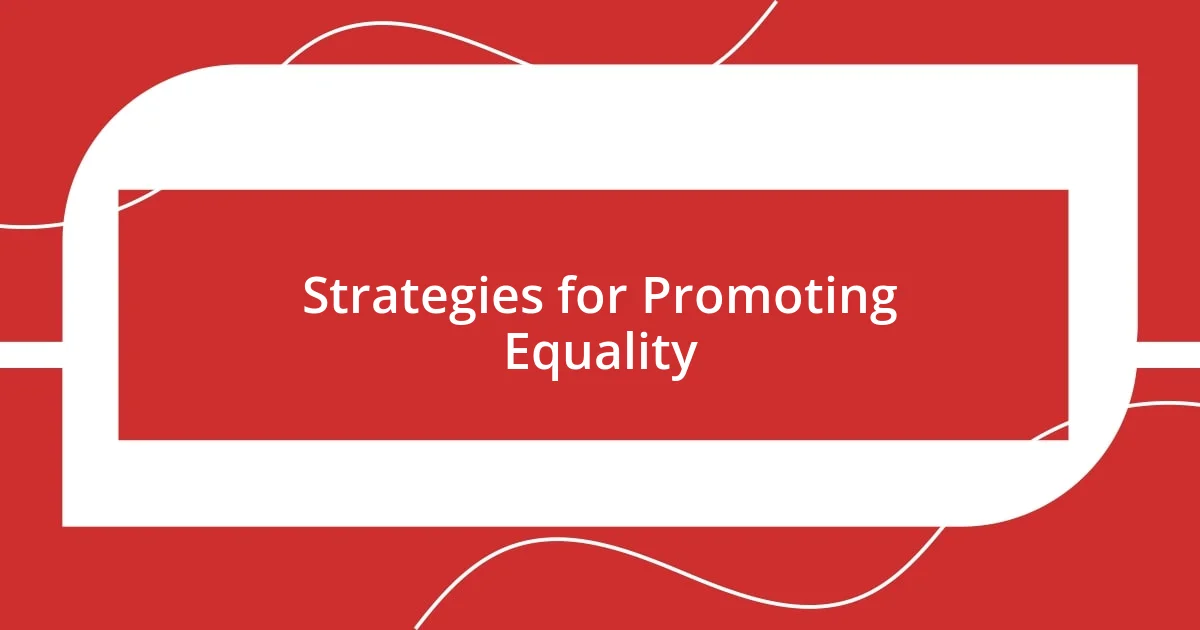
Strategies for Promoting Equality
One effective strategy for promoting equality in music is actively amplifying female voices within the industry. I’ve seen firsthand how platforms that prioritize diversity, like women-led music festivals, attract a wider audience and showcase an array of talents. It’s invigorating to attend events where female artists are not just featured but celebrated, and it makes me wonder, why aren’t these platforms more common?
Mentorship programs can also make a significant difference. When I participated in a songwriting workshop, it was inspiring to witness seasoned female musicians guiding younger artists. Imagine the impact we could create if more veteran artists invested their time in mentoring emerging female talent. This sense of community fosters resilience and builds confidence that is desperately needed in a competitive industry.
Lastly, there’s a crucial need to advocate for policy changes within music institutions. I recall attending a panel discussion where influential figures emphasized the importance of equitable funding practices for female artists. What if management teams were required to justify their gender diversity? This simple shift could compel decision-makers to think critically about representation and equity, ultimately fostering a fairer music landscape for all.
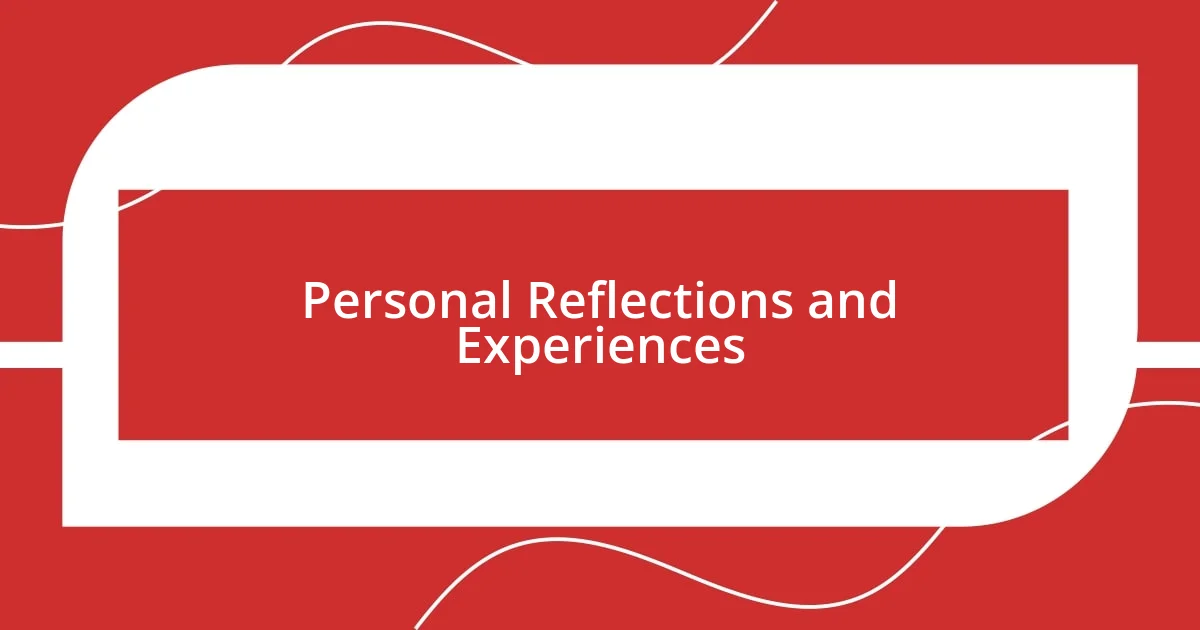
Personal Reflections and Experiences
Reflecting on my own experiences in music, I can’t help but think about the moments that made me acutely aware of gender inequality in the industry. There was a time when I attended a prestigious music conference, excited to network and learn. However, it became glaringly obvious that most discussions and panels featured men. I remember feeling invisible, wondering if my thoughts and contributions would ever be valued in that space simply because I was a woman. It left me questioning how many other talented women might feel the same in similar environments.
I also recall a time volunteering for a local women’s music group. While the passion and creativity of the female artists we hosted were evident, some whispered about the lack of opportunities for female songwriters compared to their male counterparts. It was heartbreaking to see their confidence shaken. Each story I heard added fuel to my resolve, as I realized how much the mindset of even these talented women was affected by societal expectations. It was a powerful reminder of how our experiences shape our perspective on what’s deemed acceptable in the music industry.
One memorable encounter was when a friend shared her experience trying to book gigs. Despite her incredible talent, she often overlooked opportunities because she didn’t meet industry’s narrow definitions of what a “successful” female artist should be. Listening to her frustrations resonated deeply with me. It made me ask, how can we shift these preconceptions and create spaces where women aren’t just trying to fit in, but are celebrated for their individuality and artistic vision?
